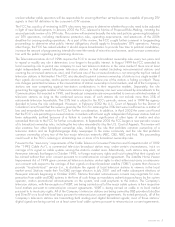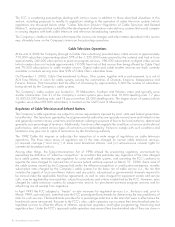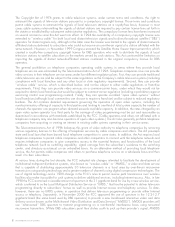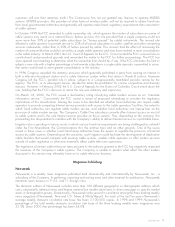Washington Post 2002 Annual Report Download - page 17
Download and view the complete annual report
Please find page 17 of the 2002 Washington Post annual report below. You can navigate through the pages in the report by either clicking on the pages listed below, or by using the keyword search tool below to find specific information within the annual report.
tors. The international editions of Newsweek are printed in England, Singapore, Switzerland, the Netherlands, South Africa
and Hollywood, Florida; insertions for The Bulletin are printed in Australia. Since 1997 Newsweek and a subsidiary of AOL
Time Warner have used a jointly owned company based in England to provide production and distribution services for the
Atlantic editions of both Newsweek and Time. In 2002 this jointly owned company began providing certain production
and distribution services for the Asian editions of these magazines. Budget Travel is produced by one of the independent
contract printers that also prints Newsweek’s domestic edition.
In 2002 The Washington Post consumed about 191,000* tons of newsprint purchased from a number of suppliers,
including Bowater Incorporated, which supplied approximately 39% of The Post’s 2002 newsprint requirements.
Although for many years some of the newsprint The Post purchased from Bowater Incorporated typically was
provided by Bowater Mersey Paper Company Limited, 49% of the common stock of which is owned by the Company
(the majority interest being held by a subsidiary of Bowater Incorporated), since 1999 none of the newsprint
consumed by The Post has come from that source. Bowater Mersey owns and operates a newsprint mill near Halifax,
Nova Scotia, and owns extensive woodlands that provide part of the mill’s wood requirements. In 2002 Bowater
Mersey produced about 255,000 tons of newsprint.
The announced price of newsprint (excluding discounts) was approximately $750 per ton throughout 2002.
Discounts from the announced price of newsprint can be substantial and prevailing discounts increased during the
first three quarters of the year and decreased slightly during the fourth quarter. The Post believes it has adequate
newsprint available through contracts with its various suppliers. Over 90% of the newsprint used by The Post includes
some recycled content. The Company owns 80% of the stock of Capitol Fiber Inc., which handles and sells to
recycling industries old newspapers and other paper collected in Washington, D.C., Maryland and northern
Virginia.
In 2002 the operations of The Daily Herald Company and Post-Newsweek Media, Inc. consumed approximately
6,500 and 20,600 tons of newsprint, respectively, which was obtained in each case from various suppliers.
Approximately 85% of the newsprint used by The Daily Herald Company and 35% of the newsprint used by Post-
Newsweek Media, Inc. includes some recycled content.
The domestic edition of Newsweek consumed about 29,200 tons of paper in 2002, the bulk of which was
purchased from six major suppliers. The current cost of body paper (the principal paper component of the magazine)
is approximately $860 per ton.
Over 90% of the aggregate domestic circulation of both Newsweek and Budget Travel is delivered by periodical
(formerly second-class) mail, most subscriptions for such publications are solicited by either first-class or standard A
(formerly third-class) mail, and all PostNewsweek Tech Media publications are delivered by periodical mail. Thus,
substantial increases in postal rates for these classes of mail could have a significant negative impact on the
operating income of these business units. In March 2002 the Postal Rate Commission approved a rate increase of
approximately 8% for both periodical and standard A mail and 9% for first-class mail, which increases became
effective on June 30, 2002. This action had the effect of increasing annual postage costs by about $2.9 million at
Newsweek and by nominal amounts at PostNewsweek Tech Media. On the other hand, since advertising distributed
by standard A mail competes to some degree with newspaper advertising, the Company believes increases in
standard A rates could have a positive impact on the advertising revenues of The Washington Post, The Herald, The
Gazette Newspapers and Southern Maryland Newspapers, although the Company is unable to quantify the amount
of such impact.
Competition
The Washington Post competes in the Washington, D.C. metropolitan area with The Washington Times, a newspa-
per which has published weekday editions since 1982 and Saturday and Sunday editions since 1991. The Post
also encounters competition in varying degrees from newspapers published in suburban and outlying areas, other
nationally circulated newspapers, and from television, radio, magazines and other advertising media, including
direct mail advertising. Since 1997 The New York Times has produced a Washington Edition which is printed
locally and includes television channel listings and weather for the Washington, D.C. area.
* All references in this report to newsprint tonnage and prices refer to short tons (2,000) and not to metric tons (2,204.6 pounds) which are often used in
newsprint price quotations.
2002 FORM 10-K 15
























